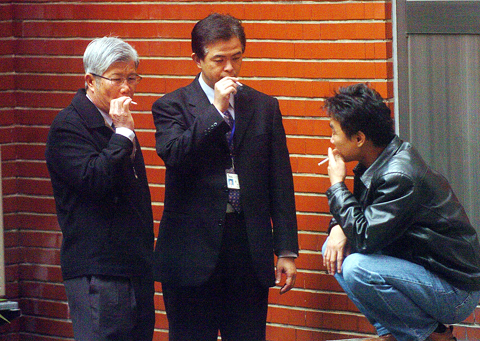The tobacco health and welfare surcharge should be gradually raised, Department of Health Minister Yeh Ching-chuan (葉金川) told the legislature’s Health, Environment and Labor Committee meeting yesterday, starting by raising it from the current NT$10 per package to NT$20 per package on Jan. 11.
The committee reviewed three versions of the draft amendment to Article 4 and Article 35 of the Tobacco Hazards Prevention and Control Act (菸害防治法) yesterday. All three called for increases in the surcharge, though they differed in several details, including the amount of the raise and the allocation of the income from the increased surcharge.
Most of the legislators on the committee agreed with the amendment proposed by the Cabinet on Oct. 30, which calls for raising the surcharge by NT$10 and using the surcharge income to subsidize the health insurance premiums of economically disadvantaged families living in remote areas or people suffering from rare diseases.

PHOTO: LIAO YAO-TUNG, TAIPEI TIMES
While the members agreed on the allocation of the surcharge, just how much the surcharge should be increased was referred to cross-party negotiations.
“Ideally, [the surcharge] should be raised a bit more, but in practice, we should do this step-by-step,” Yeh said. “The surcharge will be evaluated every two years, so we will start by raising it by NT$10 and then review the plan until we gradually meet our goal.”
When asked how much that goal was, Yeh said that experts recommended NT$30 to NT$40, which he believed to be “an ideal situation.”
If the legislature approves the Cabinet-proposed amendment, the surcharge would be raised to NT$20 per package on Jan. 11.
Meanwhile, one big change is already scheduled to take effect on Jan. 11. Smoking indoors, whether in public spaces, restaurants, bars, or offices will be banned.
A number of smokers in the legislature voiced displeasure with the new regime, which will see violators facing fines of up to NT$10,000.
However, several female legislators, all non-smokers, applauded the prospect of cleaner air inside the Legislative Yuan.
Asked for comment, Chinese Nationalist Party (KMT) Legislator Lee Hung-chun (李鴻鈞), a smoker, said the regulation was “too rigid.”
Lee said it was illogical for the state-run Taiwan Tobacco and Liquor Corp to sell cigarettes while the government was trying to ban smoking.
“I will be a victim [of the new regulation] because I usually smoke during cross-party negotiation sessions,” Democratic Progressive Party (DPP) Legislator Pan Meng-an (潘孟安) said.
“But I should follow the regulation. We can’t violate a law we passed. I will feel pain, though,” Pan said.
However, DPP Legislator Huang Sue-ying (黃淑英) said she had been bothered by second-hand smoke during legislative sessions.
In a rare display of interparty unity, KMT legislators Hung Hsiu-chu (洪秀柱) and Huang Chao-shun (黃昭順) echoed Huang Sue-ying’s comment.
Huang Chao-shun, a six-term legislator, said she had been annoyed by second-hand smoke from her colleagues over the past decade and that she would be more than happy to report legislators who violate the new regulation.
Huang Sue-ying said DPP caucus whip Ker Chien-ming (柯建銘) was one of those who smoked during cross-party negotiations.
“Our caucus whip will become healthier,” she said.

Taiwan would benefit from more integrated military strategies and deployments if the US and its allies treat the East China Sea, the Taiwan Strait and the South China Sea as a “single theater of operations,” a Taiwanese military expert said yesterday. Shen Ming-shih (沈明室), a researcher at the Institute for National Defense and Security Research, said he made the assessment after two Japanese military experts warned of emerging threats from China based on a drill conducted this month by the Chinese People’s Liberation Army’s (PLA) Eastern Theater Command. Japan Institute for National Fundamentals researcher Maki Nakagawa said the drill differed from the

‘WORSE THAN COMMUNISTS’: President William Lai has cracked down on his political enemies and has attempted to exterminate all opposition forces, the chairman said The legislature would motion for a presidential recall after May 20, Chinese Nationalist Party (KMT) Chairman Eric Chu (朱立倫) said yesterday at a protest themed “against green communists and dictatorship” in Taipei. Taiwan is supposed to be a peaceful homeland where people are united, but President William Lai (賴清德) has been polarizing and tearing apart society since his inauguration, Chu said. Lai must show his commitment to his job, otherwise a referendum could be initiated to recall him, he said. Democracy means the rule of the people, not the rule of the Democratic Progressive Party (DPP), but Lai has failed to fulfill his

A rally held by opposition parties yesterday demonstrates that Taiwan is a democratic country, President William Lai (賴清德) said yesterday, adding that if opposition parties really want to fight dictatorship, they should fight it on Tiananmen Square in Beijing. The Chinese Nationalist Party (KMT) held a protest with the theme “against green communists and dictatorship,” and was joined by the Taiwan People’s Party. Lai said the opposition parties are against what they called the “green communists,” but do not fight against the “Chinese communists,” adding that if they really want to fight dictatorship, they should go to the right place and face

A 79-year-old woman died today after being struck by a train at a level crossing in Taoyuan, police said. The woman, identified by her surname Wang (王), crossed the tracks even though the barriers were down in Jhongli District’s (中壢) Neili (內壢) area, the Taoyuan Branch of the Railway Police Bureau said. Surveillance footage showed that the railway barriers were lowered when Wang entered the crossing, but why she ventured onto the track remains under investigation, the police said. Police said they received a report of an incident at 6:41am involving local train No. 2133 that was heading from Keelung to Chiayi City. Investigators